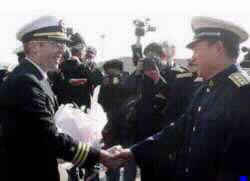- Author:
& News Agencies - Section:
WORLD HEADLINES
- Hajj & Umra WORLD HEADLINES
US Pacific commander in China as Iraq, North Korea issues heat up

The commander-in-chief of the US Pacific Fleet was in Beijing for military talks taking place as the United States was grappling with the twin issues of Iraq and North Korea.Admiral Thomas Fargo's five-day visit, which opened Friday, came amid a flurry of bilateral diplomatic activity, as the United States sought Chinese help in keeping the explosive twin issues from overwhelming the US agenda, analysts said.
"Things are coming to a head," said Paul Harris, an expert on US foreign policy at Hong Kong's Lingnan University.
"The sole US consideration on North Korea, for all the talk of the 'axis of evil', is to force North Korea onto the backburner and to focus on Iraq," he said.
Fargo arrived in Beijing just hours after the departure of Deputy Secretary of State Richard Armitage, who had met with Chinese officials to discuss Iraq.
As a permanent, veto-wielding member of the United Nations Security Council, China will be a key factor in any US plans to move militarily against Iraq.
But China is even more important when it comes to North Korea, as it is a long-term ally and major aid provider for the reclusive regime, which recently was forced to admit to a nuclear program.
Fargo will visit the cities of Beijing, Chengdu, Nanjing, Ningbo and Shanghai, and will meet with both military and civilian officials, according to the Chinese foreign ministry.
Several of Fargo's destinations are key decision-making centers for China's armed forces.
In Nanjing, Fargo will be visiting the headquarters of one of China's most important regional military districts which defends China's eastern seaboard.
The district is also responsible for any possible mainland military preparations on retaking Taiwan and is the command center that has overseen China's robust deployment of missiles facing Taiwan.
Fargo's visit follows the resumption of military-to-military relations between China and the United States.
The exchanges began in Washington earlier this week with the visit of the deputy chief of staff of China's military Xiong Guangkai.
Military-to-military exchanges were suspended following the April 2001 mid-air collision between a US spy plane and a Chinese fighter jet over the South China Sea.
The incident greatly damaged bilateral ties which have rebounded because of Chinese cooperation with Washington's war against terrorism.
The US military is lukewarm to resumed military ties, considering previous exchanges to have favored the Chinese top brass, who learned a lot about US capabilities while revealing little themselves.
PHOTO CAPTION
The Commander of USS Paul F. Foster, John Nygaard (L), shakes hands with China North Sea Fleet officer Guo Shouqian during a welcoming ceremony at a port in Qingdao, Shandong province, November 24, 2002. The destroyer, with some 340 crew, is the sixth U.S. warship to stop in Qingdao, but the first since August 2000 in another sign of warmer ties between the U.S. and China. REUTERS/Guang Niu
Related Articles
 Hajj virtues
Hajj virtues
-
School of Faith in Ten Days of Thul-Hijjah
The believing human self needs strong provocations in order to awaken whenever it is enveloped by laziness in...
-
The Status of Hajj in Islam
Hajj is the fifth pillar of Islam; Allah, The Exalted, ordained it in the ninth year after Hijrah (the Prophet's,...
-
School of Faith in Ten Days of Thul-Hijjah
The believing human self needs strong provocations in order to awaken whenever it is enveloped by laziness in relation...


 Home
Home Discover Islam
Discover Islam Quran Recitations
Quran Recitations Lectures
Lectures
 Fatwa
Fatwa Articles
Articles Fiqh
Fiqh E-Books
E-Books Boys & Girls
Boys & Girls  Hajj Rulings
Hajj Rulings Hajj Fatwas
Hajj Fatwas












